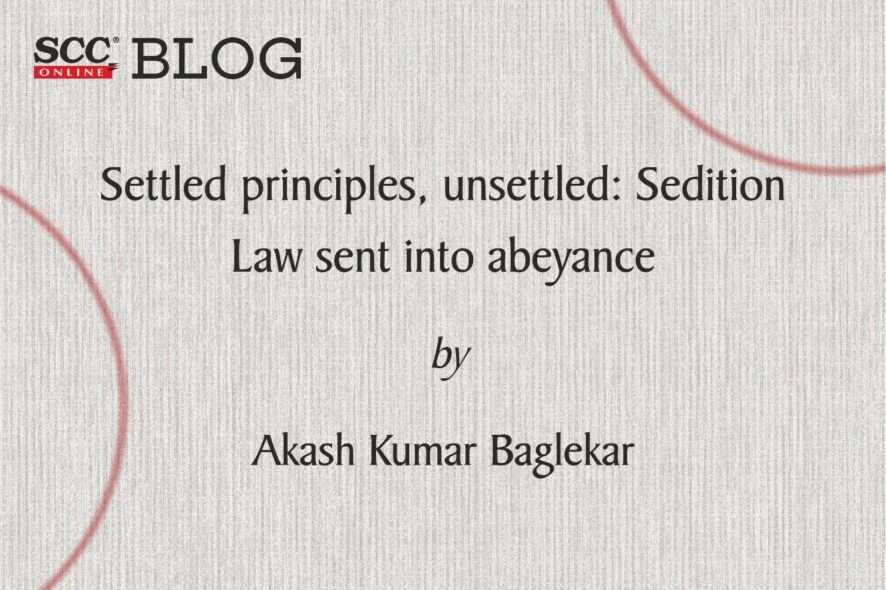On 11-5-2022, a three-Judge Bench of the Supreme Court of India in S.G. Vombatkere v. Union of India2, while dealing with the petitions challenging the constitutionality of Section 124-A3 of the Penal Code, 18604 which deals with offence of “sedition”, has directed that all pending trials, appeals and proceedings with respect to the charge framed under the said section be kept in abeyance. The Supreme Court also urged the State and Central Governments to restrain from registering any FIR under Section 124-A IPC till the Court decides the provision’s constitutional validity. In case, the court further held, the FIR is registered then the affected person is free to approach the court concerned for appropriate relief.
In simple terms, as the Supreme Court cannot direct the police not to register FIR in a cognizable offence in view of its own decision in Lalita Kumari v. Govt. of U.P.,5 it has urged the police not to register FIR under Section 124-A IPC and gave liberty to the affected party to approach the court concerned for appropriate relief if the FIR is registered. The “court concerned” here, by all accounts, means the High Court which has got power under Section 4826 of the Code of Criminal Procedure, 19737 to quash/stay the FIR. And in all likelihood, all the High Courts in India will stay the FIRs registered under Section 124-A IPC on the ground that the provision’s validity is pending consideration by the Supreme Court. This means Section 124-A IPC has been kept in abeyance not only for cases pending trials, appeals, charge but also for cases at the investigation/crime stage.
In legal sense, the operation of Section 124-A IPC has been stayed by the Supreme Court. While many are calling it as a historic order, in my opinion, the Supreme Court went against its own principles in passing the above discussed order.
It is the Court’s own craved principle in Health for Millions v. Union of India,8 that the “operation of statutory provisions cannot be stultified by granting an interim order except when the court is fully convinced that the particular enactment or rules are ex facie unconstitutional and the factors, like balance of convenience, irreparable injury and public interest are in favour of passing an interim order”. While one may argue that Section 124-A , which is “colonial era provision”, seems to be ex facie unconstitutional, causes irreparable injury and is against public interest and that in some previous cases the courts granted stay of the statute, but those were the cases where the statute was challenged immediately after its enactment. Here, Section 124-A IPC is in vogue since 152 years which does not call for a stay at this point of time. Also, the Courts granting stay or abeyance of the statute while the hearing of the case is pending will create an impression that the court has formed a particular opinion even before pronouncing the final judgment.
It is again the court’s-own-craved principle that there is always a presumption that a statute is constitutional, until the court, after hearing finally, declares it to be unconstitutional. For Section 124-A, there should be double presumption because, firstly, as per Article 372(1)9 of the Constitution all laws before the enactment of the Constitution shall continue to be in force until they are repealed by the competent legislature. That the legislature has not done it even after 72 years of coming into force of the Constitution means that the legislature in its wisdom, although may be wrong, has thought that the provision shall continue. Secondly, in Kedar Nath Singh v. State of Bihar,10 a five-Judge Constitutional Bench declared Section 124-A to be valid and not in violation of Article 19(1)(a)11 of the Constitution.
Also, in S.G. Vombatkere case,12 the Bench strength was of three Judges which was hearing the issue as to whether to refer the matter to a larger Bench as the Bench strength in Kedar Nath Singh case,13 which held Section 124-A IPC to be valid, was of five Judges. However, without deciding on the referral aspect, the 3-Judge Bench, in extreme deviation from the doctrine of stare decisis, has kept Section 124-A into abeyance.
Even assuming that Section 124-A will be declared unconstitutional by overruling Kedar Nath Singh case,14 such declaration has to apply prospectively as Article 13(1)15 uses the word “void” i.e. from the date of declaration of law and not the words “void ab initio” i.e. from the beginning. By borrowing the principle from American jurisprudence, the Supreme Court in C. Golak Nath v. State of Punjab,16 has started the doctrine of “prospective overruling”. This doctrine enunciates that when the court finds or lays down the correct law, the court restricts the operation of new found law to the future so that its impact does not fall on the past transactions.
In Chicot County Drainage District v. Baxter State Bank,17 the US Supreme Court said, “The law prior to the determination of unconstitutionality is an operative fact and may have consequences which cannot justly be ignored. The past cannot always be erased by a new judicial declaration.” Therefore, the present abeyance of all the proceedings, even before declaring Section 124-A IPC as unconstitutional, is against the doctrine of “prospective overruling.”
It is true that Section 124-A IPC is being misused by the ruling dispensation to stifle the democratic views and it is also true that Section 124-A IPC was castigated by likes of Mahatma Gandhi, Bal Gangadhar Tilak and many great intellectuals. In that scenario, the Supreme Court can give priority to hearing of the cases challenging validity of law and declare it either ways, instead of bypassing the settled principles of law.
† Advocate practising at Telangana High Court. Author can be reached at <akashbaglekar@gmail.com>.
3. Penal Code, 1860, S. 124-A.
6. Criminal Procedure Code, 1973.
7. Criminal Procedure Code, 1973, S. 482.
9. Constitution of India, Art. 372(1).
11. Constitution of India, Art. 19(1)(a).







